
Cyera
Founded Year
2021Stage
Series E | AliveTotal Raised
$1.3BValuation
$0000Last Raised
$540M | 6 mos agoRevenue
$0000Mosaic Score The Mosaic Score is an algorithm that measures the overall financial health and market potential of private companies.
+23 points in the past 30 days
About Cyera
Cyera focuses on data security posture management (DSPM) in the cybersecurity industry. The company's offerings consist of discovering and classifying sensitive data, assessing security posture, and protecting data from unauthorized access and breaches. Cyera serves sectors including financial services, healthcare, manufacturing, retail, travel, and technology services. It was founded in 2021 and is based in New York, New York.
Loading...
Cyera's Product Videos
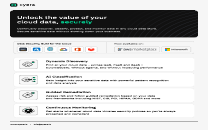
ESPs containing Cyera
The ESP matrix leverages data and analyst insight to identify and rank leading companies in a given technology landscape.
The AI security market provides specialized solutions designed to protect machine learning models, algorithms, and AI applications from AI-specific threats including adversarial attacks, data poisoning, model evasion, backdoor injections, prompt injection, and model theft. These vendors offer products spanning the entire AI lifecycle, including secure model development frameworks, runtime protecti…
Cyera named as Leader among 15 other companies, including Chainguard, Snyk, and Skyflow.
Loading...
Research containing Cyera
Get data-driven expert analysis from the CB Insights Intelligence Unit.
CB Insights Intelligence Analysts have mentioned Cyera in 4 CB Insights research briefs, most recently on Feb 25, 2025.
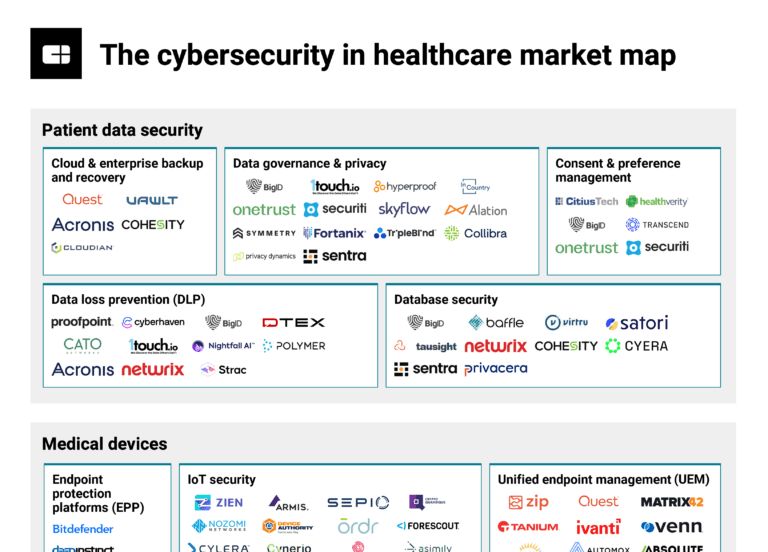
Feb 25, 2025
The cybersecurity in healthcare market map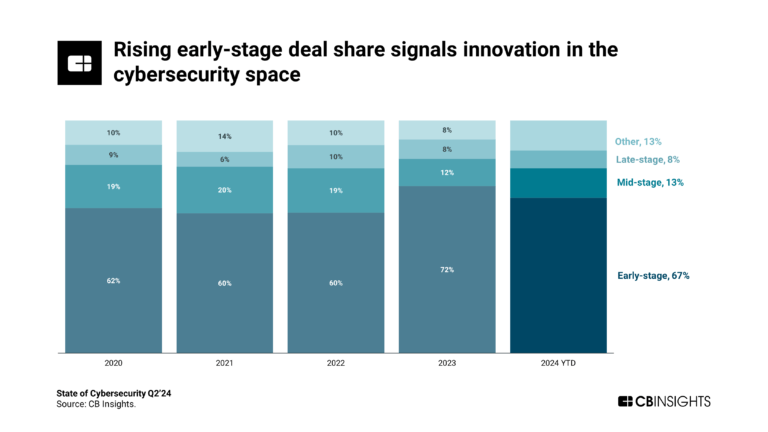
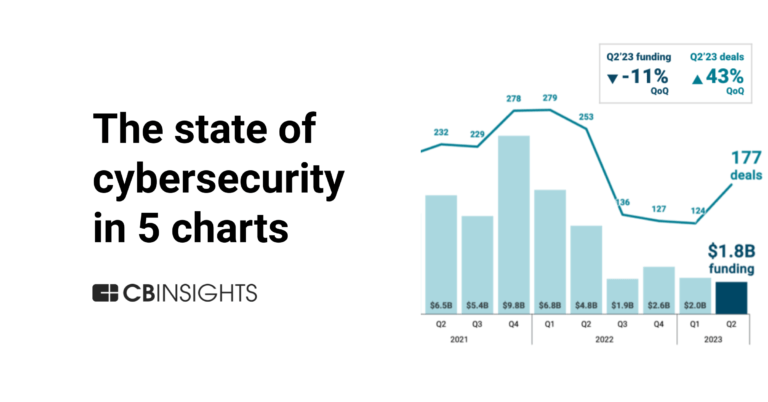
Sep 28, 2023
The state of cybersecurity in 5 charts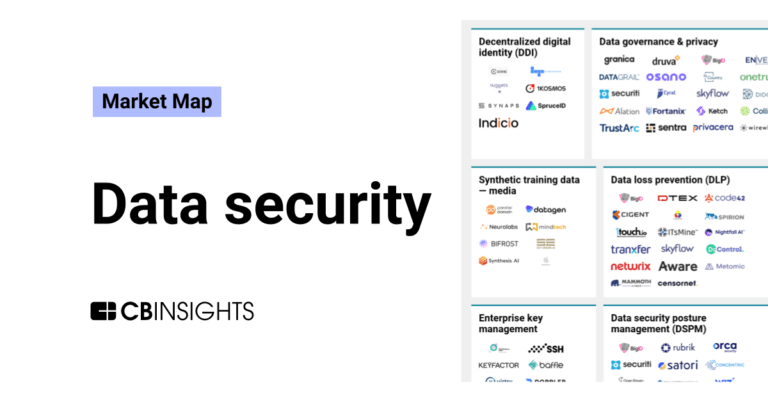
Sep 6, 2023
The data security market mapExpert Collections containing Cyera
Expert Collections are analyst-curated lists that highlight the companies you need to know in the most important technology spaces.
Cyera is included in 4 Expert Collections, including Cybersecurity.
Cybersecurity
11,028 items
These companies protect organizations from digital threats.
Unicorns- Billion Dollar Startups
1,309 items
Artificial Intelligence (AI)
20,894 items
Generative AI
2,951 items
Companies working on generative AI applications and infrastructure.
Cyera Patents
Cyera has filed 6 patents.
The 3 most popular patent topics include:
- data management
- database management systems
- cloud computing

Application Date | Grant Date | Title | Related Topics | Status |
|---|---|---|---|---|
4/27/2023 | 1/28/2025 | Data management, Data types, Substring indices, Character sets, Cryptography | Grant |
Application Date | 4/27/2023 |
|---|---|
Grant Date | 1/28/2025 |
Title | |
Related Topics | Data management, Data types, Substring indices, Character sets, Cryptography |
Status | Grant |
Latest Cyera News
Nov 14, 2025
This evolution, often called agentic AI, represents a profound shift: we're building systems that reason, make choices and take action in the world. That power comes with risk. Every decision an AI makes reflects the integrity of the data it's trained on and the safeguards defining its boundaries. As Jason Clark , chief strategy officer at Cyera , told me, “AI is a superpower that consumes a lot of data and creates a lot of data.” The challenge, he said, is that those two forces—AI and data governance—have to go together. That's exactly the premise of Cyera's DataSecAI 2025 Conference , a hybrid event uniting CISOs, researchers and policymakers to redefine how data and AI security intersect. In just its second year, the conference has already drawn over 1,000 attendees from around the world. “When we started this, we thought maybe a hundred people would come,” Clark said with a laugh. “We ended up with three hundred, 70 percent of them C-level.” The reason, he added, is simple: everyone is trying to figure out how to secure AI before it scales beyond control. From Defense to Discovery For decades, cybersecurity has focused on chasing threats—patching vulnerabilities and reacting to breaches. Clark argues that AI changes that equation entirely. “We've been chasing threats and vulnerabilities for so long that we never solved the data problem,” he told me. “Because of AI, that problem just got a hundred times bigger.” Cyera's latest AI Readiness Report backs that up. The research found that 70 percent of organizations are deploying AI tools without fully understanding their data exposure. The result is a widening gap between innovation and protection—a gap that AI itself could help close if governed responsibly. Industry data from Omdia further underscores the pace of adoption and the risks accompanying it. “Enterprises are enthusiastically investing in generative AI and AI agents in particular,” said Todd Thiemann , cybersecurity industry analyst at Omdia. “Omdia research shows that an overwhelming 80% of organizations say AI agents are the top or a high priority compared to other AI initiatives.” According to Thiemann, the first wave of agent adoption is focused on relatively low-risk use cases—embedded assistants like Salesforce Agentforce or Workday agents that improve productivity without touching sensitive systems. “Where things are headed is for agents to touch core enterprise applications,” he explained. “That is where you can unlock big value, but also where you encounter big cybersecurity risk.” As AI agents move closer to the heart of the enterprise, the stakes rise. Without robust access controls, auditability and behavioral monitoring, what begins as a time-saving tool can become an unmonitored point of compromise. That's part of what DataSecAI 2025 aims to explore: how AI can strengthen, not weaken, the security posture of enterprises. Clark sees it as an opportunity for security leaders to step into a new role—one that's not just defensive but strategic. “Security teams are becoming the first part of the business that truly understands where data lives, how valuable it is and who's using it,” he said. “That changes the conversation from ‘no, you can't do that' to ‘let me help you do it safely.'” Keeping Agents on a Leash Our conversation turned to the growing phenomenon of AI agents—digital workers that log in, perform tasks and interact with systems much like humans do. I mentioned that some companies are already assigning employee numbers to AI agents. It sounds far-fetched, but it's happening. And as I told Clark, that means we can't treat these agents as simple software processes anymore. They behave like employees, and they need to be governed like employees—with distinct identities, permissions and oversight. Clark agreed. “You need to have your agents on a leash,” he said. “It's all about how loose you let that leash be, but you still have to keep them on the leash.” It's a vivid metaphor, and it captures the challenge perfectly. Agentic AI gives us what Clark calls “Tony Stark Iron Man-suit capabilities”—superhuman memory, speed and reach—but without guardrails, that power can run amok. We both agreed that the only sustainable approach is layered trust: giving AI agents autonomy in stages, just as you would with a new employee. At first, you check their work constantly; later, you loosen the leash as confidence builds. “There's always a human in the loop,” Clark reminded me. “The question is how far along the autonomy scale you're willing to go.” Education as Infrastructure One of the most encouraging steps Cyera has taken is launching the AI Security School , a free program designed to train professionals to understand and mitigate AI-driven risks. The courses cover everything from model governance to data classification and behavioral monitoring—bridging the gap between theoretical security and practical defense. This is more than corporate goodwill. As Clark pointed out, security talent is being asked to evolve faster than ever before. “AI breaks everything we do today,” he said. “So we have to re-educate the industry on how to think about access, behavior and data all together.” Education becomes the connective tissue of resilience—the means by which organizations can adapt as fast as technology itself. Trust as the New Perimeter Trust has become a recurring theme in my conversations this year, especially around AI. It's not just about trusting the data or the model—it's about trusting that the systems interpreting our world are doing so faithfully. Clark and I agreed that AI will inevitably make mistakes, and that perfection isn't the right benchmark. “If you expect 100 percent accuracy, you're missing the point,” I told him. “Even human employees aren't infallible.” Clark agreed but emphasized the need for constant oversight at scale. “You might check one agent's work manually,” he said, “but what happens when you have a thousand agents running across applications? You'll need agents overseeing agents—and something watching them all.” It's a dizzying vision: an ecosystem of digital workers, supervisors and monitors—a hierarchy of intelligence that mirrors human organizations. But at its heart, it all comes back to one principle: the data must be right. Without that, trust collapses. Building Intelligent Trust As I see it, the DataSecAI 2025 Conference isn't just about technical controls—it's about redefining confidence in the age of autonomy. Cyera's combination of research, education and community shows what that future could look like: transparent, governed and human-aligned. We don't need to fear AI; we need to understand it. And that understanding begins with the data beneath it.
Cyera Frequently Asked Questions (FAQ)
When was Cyera founded?
Cyera was founded in 2021.
Where is Cyera's headquarters?
Cyera's headquarters is located at 500 7th Avenue, New York.
What is Cyera's latest funding round?
Cyera's latest funding round is Series E.
How much did Cyera raise?
Cyera raised a total of $1.3B.
Who are the investors of Cyera?
Investors of Cyera include Accel, Sequoia Capital, CyberStarts, Redpoint Ventures, Coatue and 23 more.
Who are Cyera's competitors?
Competitors of Cyera include Teleskope, Sentra, Guardz, Normalyze, Concentric AI and 7 more.
Loading...
Compare Cyera to Competitors

Sentra provides services related to cloud-native data security, including Data Security Posture Management (DSPM) across various environments. The company's services involve the discovery and classification of sensitive data, management of security posture, and enforcement of access controls to protect against unauthorized access and data breaches. Sentra serves sectors that require data security and compliance, such as financial services, healthcare, and retail. It was founded in 2021 and is based in Tel Aviv, Israel.

Qohash provides data security solutions for the technology sector. It offers a platform that provides data discovery, insider risk tracking, and data security posture management. Its main product, Qostodian, scans various data sources such as Microsoft 365, workstations, and on-premise file drives and provides continuous monitoring of individual data elements. It primarily serves the information security and compliance sectors. It was founded in 2017 and is based in Quebec City, Canada.

Symmetry Systems focuses on data security posture management within the cybersecurity sector. The company provides solutions that discover, classify, and protect data, including monitoring and responding to data threats to ensure compliance and mitigate risks related to artificial intelligence (AI) technologies. Symmetry Systems serves various sectors including financial services, healthcare, communication, technology, retail, manufacturing, federal government, energy, and education. It was founded in 2019 and is based in San Francisco, California.

PKWARE provides software solutions for data discovery, classification, encryption, and protection of sensitive data across various environments, including endpoints, clouds, and mainframes. The company's products aim to assist organizations in complying with data regulations and protecting against data breaches. It was founded in 1986 and is based in Milwaukee, Wisconsin.

BigID operates in the data security, privacy, compliance, and governance sectors of technology. It provides a platform for organizations to discover, manage, protect, and analyze their data across multicloud, hybrid cloud, IaaS, PaaS, SaaS, and on-premises environments. The company's offerings include data discovery and classification, privacy automation, regulatory compliance, and AI risk management. It was founded in 2016 and is based in New York, New York.

Immuta operates in the technology sector, providing services related to data security and governance. Its platform includes data security, governance, and continuous monitoring to manage sensitive data across data ecosystems. It was founded in 2015 and is based in College Park, Maryland.
Loading...
